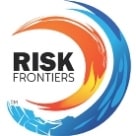Severe thunderstorms are a frequent and harmful natural disaster in Australia, causing significant damage. Since 1985, on average, more than half of the annual reported industry insured losses have been caused by severe thunderstorm events. Although large outbreaks can result in insured losses exceeding AUD 25 million, smaller events with lower losses can still impact a company’s portfolio on an aggregate basis or a more rural portfolio on an occurrence basis.
Risk Frontiers’ HailAUS model integrates statistical and physical modeling with the latest meteorological research and claims data to accurately capture severe thunderstorms with potential for causing loss across Australia. The model addresses reporting biases and climate change trends through a novel detrending approach that leverages radar and observation data.
The model also takes into account that a single storm can cause varying damage to properties within a portfolio, with updates to building codes impacting the vulnerability of structures. The component-based vulnerability framework of the model considers primary and secondary building characteristics, as well as every type of roof damage, to provide a location-level view of the risk.
The extensive validation of each component of the model against billions of dollars of claims data, damage surveys, engineering research, historical events, and industry experience ensures that an accurate view of the risk can be obtained to prepare for the next severe thunderstorm before it occurs.
HailAUS Model Overview
HailAUS 8.0 uses a storm proxy derived from ERA5 and calibrated with radar derived analyses of frequency from recent literature.
The model is built upon the Bureau of Meteorology’s radar network, internal archives of historical hazard events and our PerilAUS database, along with reanalysis climate variables. Hail footprints are elliptical with concentric levels of estimated hail size, with damage estimates calculated for each exposure within this ellipse.
The motor vulnerability component accounts for the density of cars based on time of year, time of day, and the nature of the location (e.g., car parks for airports, universities, or major shopping centres) for loss estimation.
HailAUS Features
Hailstorm proxy
Updated relationships between gridded climate products and observed storm frequency. Also using latest resolution analysis products. Improved regional expression of hail frequency. Unified dataset allows for correlation between atmospheric perils and projection of hail risk into multiple future scenarios.
Stochastic Storm footprints
HailAUS 8.0 stochastic storm footprints can represent real storms that are more extensive and complex than a single elliptical swath. Storms may now have multiple footprints of varying size, in accordance with radar observation.
Post-Event Response
In the event of a significant storm, Risk Frontiers can retrieve radar imagery and estimate potential losses within 48 hours. The same technique can be used to estimate the impact from historic storm scenarios.
Who can utilise HailAUS?
Insurers/Reinsurers
HailAUS can assist insurance and reinsurance companies in setting premiums for insurance and re-insurance policies associated with hailsone damage associted with Severe Convective Storms.
Agriculture
Because the hazard component of HailAUS covers all of Australia, the model can be used for bespoke analysis of hail risk to different crop types given seasonal susceptibility data.
Emergency Management
Emergency management organisations can use the tool to inform resource allocation based on likely impacted regions.
HailAUS Technical Specifications
Hazard Resolution | Gridless, point location level |
Exposure Resolution | Location Address Level |
Event Catalogue | 50,000 year stochastic catalogue |
Line of Business | Residential / Commercial / Industrial / Motor |
Business Interruption | Residential ALE / Commercial / Industrial |
Coverage | National coverage of mainland Australia and Tasmania. |

Learn More About HailAUS
Get the opportunity to speak with the team who developed the HailAus model.
Briefing Notes
Read our latest research
Delve into the insightful articles on climate risk and resilience from the team of risk scientists at Risk Frontiers.
Hurricane Helene: The significance and destruction
Hurricane Helene: The significance and destruction Jacob Evans, Risk Frontiers Hurricane Helene was the strongest hurricane (tropical cyclone) on record to strike the Big Bend
How much longer will the Muswellbrook earthquake swarm last
How much longer will the Muswellbrook earthquake swarm last Paul Somerville The ongoing Muswellbrook earthquake swarm (Risk Frontiers, 2024, Briefing Note 503) has now continued
A Wild and Windy end to Winter 2024
A Wild and Windy end to Winter 2024 Stuart Browning During the last week of August and into early September, Southern Australia experienced a prolonged
